216 books about German and 6
start with L
216 books about German and 6
216 books about German
6 start with L start with L
6 start with L start with L
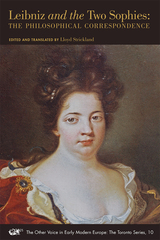
Leibniz and the Two Sophies
The Philosophical Correspondence
Gottfried Wilhelm Leibniz, Sophie Electress of Hanover, Queen Sophie Charlotte of Prussia
Iter Press, 2011
In his introduction, Lloyd Strickland proposes that Sophie, Electress of Hanover, and her daughter, Queen Sophie Charlotte of Prussia, found consolation in the idea of divine justice. Too long themselves unfairly dismissed as philosophical lightweights, proper justice may now be given to their views through this edition of their private correspondences with Leibniz. Appearing for the first time in English translation, the philosophical selections cover topics from the nature of substance to universal salvation and evidence the independence of the women’s thought as they defend materialism and challenge Leibniz’s conviction that God created the best possible world. The edition also boasts copious and highly informative editorial notes. It is a most welcome addition to The Other Voice in Early Modern Europe: Toronto series.
[more]
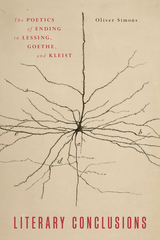
Literary Conclusions
The Poetics of Ending in Lessing, Goethe, and Kleist
Oliver Simons
Northwestern University Press, 2022
Endings are not just singular moments in time but the outcomes of a process. And whatever a book’s conclusion, its form has a history. Literary Conclusions presents a new theory of textual endings in eighteenth-century literature and thought. Analyzing essential works by Gotthold Ephraim Lessing, Johann Wolfgang von Goethe, and Heinrich von Kleist, Oliver Simons shows how the emergence of new kinds of literary endings around 1800 is inextricably linked to the history of philosophical and scientific concepts.
Simons examines the interrelations of Lessing’s literary endings with modes of logical conclusion; he highlights how Goethe’s narrative closures are forestalled by an uncontrollable vital force that was discussed in the sciences of the time; and he reveals that Kleist conceived of literary genres themselves as forms of reasoning. Kleist’s endings, Simons demonstrates, mark the beginning of modernism. Through close readings of these authors and supplemental analyses of works by Walter Benjamin, Friedrich Hölderlin, and Georg Wilhelm Friedrich Hegel, he crafts an elegant theory of conclusions that revises established histories of literary genres and forms.
Simons examines the interrelations of Lessing’s literary endings with modes of logical conclusion; he highlights how Goethe’s narrative closures are forestalled by an uncontrollable vital force that was discussed in the sciences of the time; and he reveals that Kleist conceived of literary genres themselves as forms of reasoning. Kleist’s endings, Simons demonstrates, mark the beginning of modernism. Through close readings of these authors and supplemental analyses of works by Walter Benjamin, Friedrich Hölderlin, and Georg Wilhelm Friedrich Hegel, he crafts an elegant theory of conclusions that revises established histories of literary genres and forms.
[more]

Literary Intellectuals and the Dissolution of the State
Professionalism and Conformity in the GDR
Edited by Robert von Hallberg
University of Chicago Press, 1996
For two generations, writers in the German Democratic Republic enjoyed a massive audience in their own country, a readership dependent on their works for a measure of utopian solace amid the grimness of life under Communism. But after the fall of the Berlin Wall, these writers were abandoned by their readers and stripped of the professional structures that had supported them. Their literary culture destroyed, they were rebuked for compliant service to the discredited state; and some were reviled for collaborating with the East German secret police, the Stasi.
What drove leading thinkers, including those of the avant-garde who publicly embraced intellectual freedom, to serve as government informants? Why were they content to work within a repressive system rather than challenging it outright? This collection of interviews with more than two dozen writers and literary scholars, including several Stasi informants, provides a gripping, often dismaying picture of the motivations, compromises, and illusions of East German intellectual life.
In conversations with Robert von Hallberg, writers such as best-selling novelist Hermann Kant, playwright Christoph Hein, and avant-garde poet-publisher Sascha Anderson talk about their lives and work before the fall of the wall in 1989—about the constraints and privileges of Communist Party membership, experiences of government censorship and self-censorship, and relations with their readers. They reflect on why the possibilities of opposition to the state seemed so limited, and on how they might have found ways to resist more aggressively. Turning to the controversies that have emerged since reunification, including the Stasi scandals involving Anderson and Christa Wolf, they discuss their feelings of complicity and the need for further self-examination. Two interviews with Anderson—one conducted before he was exposed as a Stasi collaborator and one conducted afterward—offer unique insight into the double life led by many writers and scholars in the German Democratic Republic.
What drove leading thinkers, including those of the avant-garde who publicly embraced intellectual freedom, to serve as government informants? Why were they content to work within a repressive system rather than challenging it outright? This collection of interviews with more than two dozen writers and literary scholars, including several Stasi informants, provides a gripping, often dismaying picture of the motivations, compromises, and illusions of East German intellectual life.
In conversations with Robert von Hallberg, writers such as best-selling novelist Hermann Kant, playwright Christoph Hein, and avant-garde poet-publisher Sascha Anderson talk about their lives and work before the fall of the wall in 1989—about the constraints and privileges of Communist Party membership, experiences of government censorship and self-censorship, and relations with their readers. They reflect on why the possibilities of opposition to the state seemed so limited, and on how they might have found ways to resist more aggressively. Turning to the controversies that have emerged since reunification, including the Stasi scandals involving Anderson and Christa Wolf, they discuss their feelings of complicity and the need for further self-examination. Two interviews with Anderson—one conducted before he was exposed as a Stasi collaborator and one conducted afterward—offer unique insight into the double life led by many writers and scholars in the German Democratic Republic.
[more]
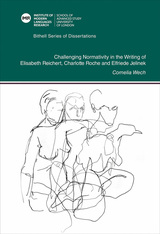
Literature as Intervention
Challenging Normativity in the Writing of Elisabeth Reichert, Charlotte Roche and Elfriede Jelinek
Cornelia Wech
University of London Press, 2020
This study examines how the literary works of Elisabeth Reichart, Charlotte Roche, and Elfriede Jelinek challenge normativity both in their engagement with gender and sexuality and with aesthetic choices. The comparative analysis of texts published over a twenty year-period provides insights into the socio-political and cultural dynamics at the time of publication, and reveals the continuing relevance of feminist authorial voices to the present day, challenging the stable, normative understanding of feminism and feminist writing itself, and showing how literature can function as a form of intervention that provides a reflective space for readers to question norms in their own lives and to take the initiative to change these norms.
[more]
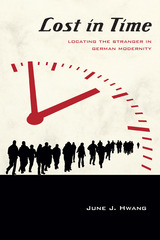
Lost in Time
Locating the Stranger in German Modernity
June J. Hwang
Northwestern University Press
June J. Hwang’s provocative Lost in Time explores discourses of timelessness in the works of central figures of German modernity such as Walter Benjamin, Georg Simmel, Siegfried Kracauer, and Helmuth Plessner, as well as those of Alfred Döblin, Joseph Roth, and Hugo Bettauer. Hwang argues that in the Weimar Republic the move toward ahistoricization is itself a historical phenomenon, one that can be understood by exploring the intersections of discourses about urban modernity, the stranger, and German Jewish identity.
These intersections shed light on conceptions of German Jewish identity that rely on a negation of the specific and temporal as a way to legitimize a historical outsider position, creating a dynamic position that simultaneously challenges and acknowledges the limitations of an outsider’s agency. She reads these texts as attempts to transcend the particular, attempts that paradoxically reveal the entanglement of the particular and the universal.
[more]
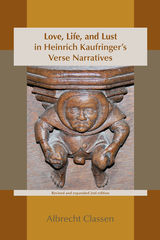
Love, Life, and Lust in Heinrich Kaufringer's Verse Narratives
Albrecht Classen
Arizona Center for Medieval and Renaissance Studies, 2015
READERS
Browse our collection.
PUBLISHERS
See BiblioVault's publisher services.
STUDENT SERVICES
Files for college accessibility offices.
UChicago Accessibility Resources
home | accessibility | search | about | contact us
BiblioVault ® 2001 - 2024
The University of Chicago Press









